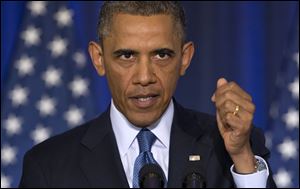
Amid ‘scandals,’ governing
5/28/2013
President Obama recalibrates his counterterrorism strategy in a speech last week.
The first article of conventional wisdom about the scandals that have lately embroiled the Obama Administration — Benghazi, the Internal Revenue Service, and the Justice Department’s pursuit of leaks to journalists — is that they are the President’s fault. That doesn’t quite fly.
If the beef with President Obama is that he is too remote and Olympian, that doesn’t square with the image of him as a micromanager of Nixonian cover-ups and government spying.
The IRS was out of hand; the Department of Justice was even more so. But the President fired the head of the IRS and, we suspect, will replace Attorney General Eric Holder before too long, Once the smoke clears and the politically manufactured hysteria dies down, the scandals will likely ease — precisely because they don’t reach the Oval Office.
The second article of received wisdom is that the President has been permanently damaged by these distractions. But that is true only if he believes it. So long as he chooses to use his bully pulpit, he still has the most power in the government and the biggest lectern. So long as he sticks to his agenda — public-works jobs, debt reduction, immigration reform, and gun control — he will not ultimately lose that agenda.
The President demonstrated this truth last week with his national security speech. He outlined his ideas for winding down the war on terror, renewed his plan to close the prison at Guantanamo, and avowed that he intends to control the Central Intelligence Agency — a task at least as important as reining in the IRS.
Presidential speeches don’t execute policy, but they do make it. Mr. Obama’s speech was important because a democratic republic cannot remain in a permanent state of war.
Second, the CIA should not be a war-making agency. And third, this country should not be detaining prisoners without due process for years on end. That’s not who we are.
The President made the case for his use of drone strikes. He said drones are flawed and dangerous, but they can minimize civilian casualties. He promised “to review proposals to extend oversight of lethal actions outside of war zones that go beyond our reporting to Congress.”
He pledged “to engage Congress … to determine how we can continue to fight terrorists without keeping America on a perpetual wartime footing.” That is a vital message: Time to begin rolling back the national security state.
The President was getting back to who we are and who he is. He was setting the agenda. And he pledged to review the Attorney General’s approach to prosecuting national security leaks, which Republicans previously have criticized as too lax.
For all the talk about Mr. Obama’s alleged passivity, he has set the agenda on such issues as expanding health insurance, ending two wars, stabilizing the economy, and reforming immigration and gun regulation.
There was no percentage for the President in returning to the topic of the horrific prison at Guantanamo. But it was the right thing to do.
You hear that this President is diminished. But you have to ask: Compared to whom? While much of Congress goes on Benghazi witch hunts and launches pointless and endless investigations of this outrage or that, the President’s political operatives and a few senators are pushing toward action on immigration, the deficit is coming down, and Obamacare is being carried out at less, not more, cost than what was expected.
Beyond the sideshow is governance. It’s not of great interest to much of the public, the media, or Congress, but the President is doing his job. The terror speech was a serious address about serious problems by a serious man doing a difficult job. What is the rest of Washington offering?